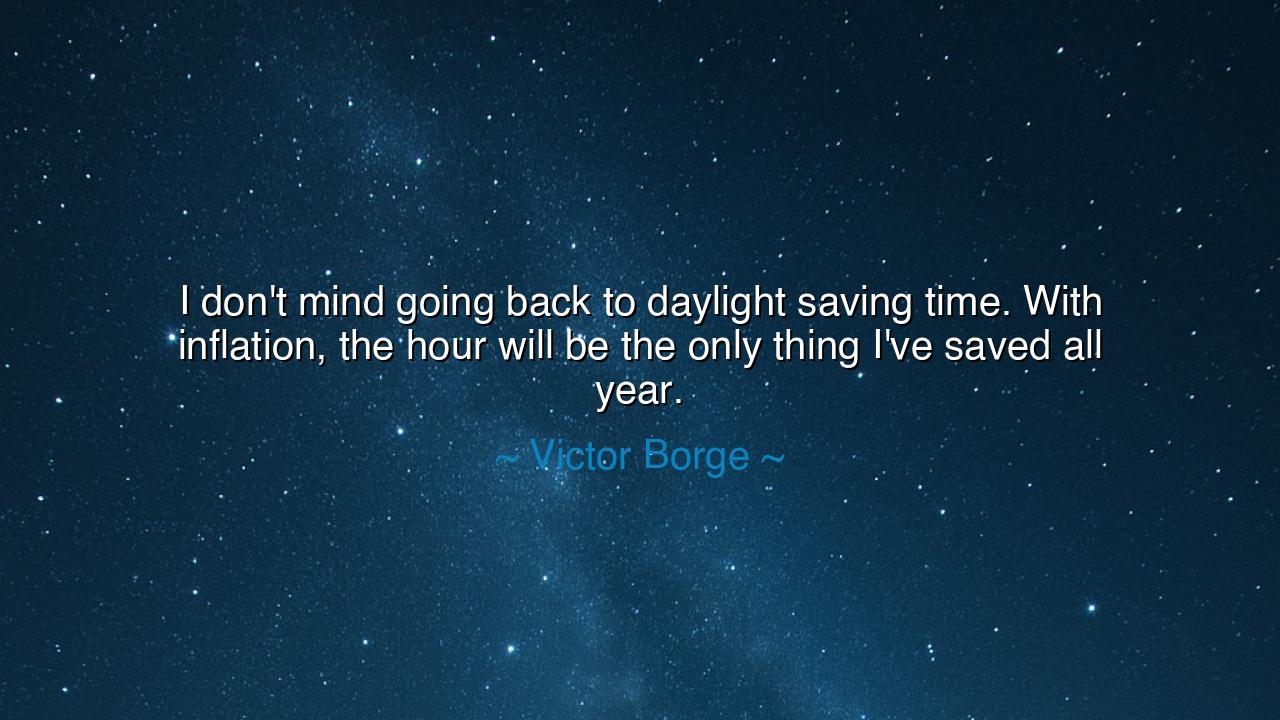
I don't mind going back to daylight saving time. With inflation
I don't mind going back to daylight saving time. With inflation, the hour will be the only thing I've saved all year.






Victor Borge, the Danish-American comedian and pianist, with his wit as sharp as the strings of a harp, once said: “I don’t mind going back to daylight saving time. With inflation, the hour will be the only thing I’ve saved all year.” At first, the words ring with humor, light and playful. Yet within the jest lies a deeper wisdom, for the greatest truths are often clothed in laughter. He speaks not only of clocks and coins, but of the fleeting nature of wealth, the burdens of economy, and the eternal value of time itself.
The meaning of his words rests in the contrast between money and time. Inflation, the endless rise of costs, devours the fruits of labor and mocks the saver. What is stored in coin often shrinks in value, until all one’s toil seems diminished. Yet while riches wither, there remains one treasure that all men are granted equally: the hours of the day. In jest, Borge claims that in the shifting of the clock, he finds his only true savings—an hour wrested back from the march of time. And though he smiles as he says it, the truth is sobering: wealth may vanish, but time, once given, is of greater worth than gold.
Daylight saving time itself was born of practicality, first suggested in the modern age as a way to make better use of daylight and conserve energy. But Borge’s quip lifts it into metaphor: in a world of uncertainty and economic struggle, we must remember that even one hour is precious, a jewel to be cherished when all else seems unstable. This is not merely comedy—it is wisdom cloaked in laughter, teaching us that to save time is to save life itself.
History offers us many lessons about this truth. Consider the Great Depression of the 1930s, when countless families saw their savings vanish overnight. Banks failed, jobs disappeared, and inflation gnawed at what little remained. Yet many who endured that time later said that what they remembered most was not the money lost, but the time spent together—families gathering close, neighbors helping neighbors, children finding joy in games that cost nothing. Wealth was consumed, but the hours of fellowship, though humble, became treasures that no inflation could erode.
Thus the deeper lesson emerges: laughter may jest about saving an hour, but behind the jest is a cry to value what endures. Money rises and falls, economies flourish and falter, but time is the true currency of life. To waste it is to become poorer than any inflation could make us. To cherish it is to grow rich beyond measure, even if the purse is light. Victor Borge, a man who united comedy and music, reminds us through humor to measure our lives not by what we store in banks, but by how we use the hours granted to us.
The call for us is clear: guard your hours. Do not give them cheaply to distraction or worry. Spend them on what is worthy—on love, on learning, on service, on joy. When you look back at the years of your life, it will not matter how many coins you held, but how many hours you filled with meaning. If inflation robs you of wealth, let it not rob you of purpose. For the richest man is not he who saves the most money, but he who invests his time wisely.
So let us take Borge’s jest as a banner of wisdom: “With inflation, the hour will be the only thing I’ve saved all year.” Laugh with him, but also learn from him. When the world shakes and gold slips away, look to the hour, look to the day, look to the time you still hold in your hands. For in time lies the true wealth of mortals—wealth that, once cherished, no force on earth can devalue.






AAdministratorAdministrator
Welcome, honored guests. Please leave a comment, we will respond soon